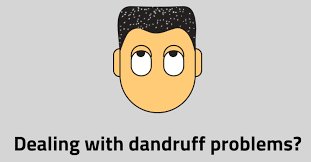Understanding and Managing Dandruff


What is Dandruff and Why Does it Appear?
Have you ever noticed white flakes on your shoulders and wondered what they are? The answer is dandruff, a common scalp issue that affects millions of people worldwide. Dandruff is the shedding of dead skin cells from the scalp in larger amounts than normal. While shedding skin is natural, dandruff appears when this process speeds up.
- White or yellowish flakes on the scalp and hair
- Mild scalp itching and irritation
- Flakes may be more visible on darker clothes
- Can affect people of any age or gender
Dandruff is not dangerous, but it can be annoying and sometimes embarrassing.
Common Triggers of Dandruff
Why does dandruff appear more in some people than others? Several triggers can worsen or start dandruff. Knowing these helps in preventing it.
- Dry skin, especially during cold seasons
- Excess oil on the scalp leading to buildup
- Stress that affects scalp health
- Sensitivity to certain hair products
- Poor diet lacking in scalp-supporting nutrients
Understanding the triggers allows people to take preventive steps and reduce flare-ups.
Symptoms People Notice First
How do you know if you have dandruff or another scalp condition? Symptoms of dandruff are usually easy to notice.
- Itchy scalp that feels uncomfortable
- Visible flakes on hair, scalp, or clothes
- Mild redness or irritation
- Increased scalp dryness or oiliness
Recognizing these early signs helps people choose the right care before it becomes more bothersome.
Lifestyle Habits that Worsen Dandruff
While dandruff can sometimes appear without reason, many daily habits unknowingly make it worse. Hair care routines, stress, and overall health can all affect how the scalp behaves. If dandruff continues to return, looking closely at daily habits is often the first step in identifying what may be going wrong.
- Irregular hair washing routine
- Using harsh shampoos or hair sprays
- Not rinsing products properly from hair
- Stressful lifestyle without enough sleep
- Lack of hydration and poor scalp hygiene
Simple changes in lifestyle can make a big difference in controlling dandruff.
Natural Ways to Control Dandruff
Many people prefer to try natural methods first before turning to medicated products. Natural approaches may not completely cure dandruff but often provide relief for mild cases. These methods focus on scalp cleanliness, diet, and stress management, which all play a role in overall scalp health. Regular care can also prevent the buildup of oil and dead skin cells that make dandruff more noticeable.
- Regular gentle washing with mild shampoo
- Keeping the scalp hydrated
- Reducing use of styling products
- Eating a balanced diet rich in zinc and vitamins
- Managing stress through relaxation techniques
These steps do not remove dandruff completely but can help reduce its intensity.
When to Consider Stronger Treatments
In some cases, dandruff does not go away with natural care alone. If itching becomes severe, flakes are very persistent, or redness spreads, it may be time to look for stronger treatments. Medicated shampoos or dermatologist-prescribed solutions can help when ordinary methods fail. This is especially true for people whose dandruff is linked to fungal growth or chronic skin irritation.
- Over-the-counter shampoos with antifungal or soothing ingredients
- Dermatologist-recommended solutions for severe irritation
- Treatments that reduce yeast overgrowth on the scalp
- Longer use of specialized products for maintenance
For stubborn dandruff, stronger treatment options are often necessary for real relief.
Fungicyte (Ketoconazole) for Dandruff Relief
When regular shampoos do not work, antifungal solutions can help control the problem more effectively. Fungicyte, which contains ketoconazole, is one of the most widely used options for persistent dandruff. It works by targeting the fungal activity that often contributes to scalp irritation and flaking. Many people find that this type of treatment provides quicker and longer-lasting relief than standard shampoos.
- Reduces fungal growth on the scalp
- Helps calm itching and irritation
- Works well for long-term dandruff control
- Often used when regular shampoos do not help
- Fungicyte can be a strong choice when dandruff keeps coming back despite simple care.
Long-Term Care with Fungicyte (Ketoconazole)
Even with effective treatment, dandruff has a tendency to return if scalp care is ignored. That is why long-term solutions are important. Fungicyte, when used consistently, can help keep dandruff under control and prevent frequent flare-ups. Combining it with healthy lifestyle choices and natural scalp care routines provides the best results for ongoing scalp health.
- Works to balance scalp health
- Provides relief from repeated flare-ups
- Can be combined with lifestyle and natural care
- Offers effective support for people struggling with chronic dandruff
Proper use of Fungicyte can bring lasting comfort and confidence for those facing persistent dandruff.
Final Thoughts
Dandruff is a common issue that can affect self-confidence and comfort, but it is manageable with the right care. Understanding what causes it, recognizing the symptoms, and taking steps to prevent flare-ups can greatly reduce its impact. Natural care methods work for mild cases, while medical treatments like Fungicyte offer effective relief for stubborn dandruff. Consistency, patience, and professional advice are key to long-term scalp health.
Drug Description Sources: U.S. National Library of Medicine, Drugs.com, WebMD, Mayo Clinic, RxList
Reviewed and Referenced By:
- Dr. James Anderson – Dermatologist specializing in scalp conditions, contributor to Mayo Clinic resources
- Dr. Sarah Mitchell – Medical researcher linked with U.S. National Library of Medicine publications
- Dr. Robert Lewis – Pharmacology expert providing data to Drugs.com and RxList
- Dr. Emily Carter – Family medicine specialist referencing WebMD health topics
- Dr. Laura Bennett – Clinical reviewer with experience in dermatology articles for Mayo Clinic and WebMD
Article Post: Editorial Team of RXShop.md
(Updated at Oct 4 / 2025)

